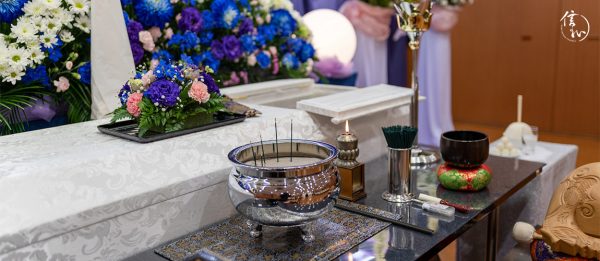
Planning a funeral is an emotional process that is often shrouded by uncertainty. While it is advisable to pre-plan a funeral and discuss one’s end-of-life wishes with their loved ones, many Singaporeans often do not do so as death is still widely considered a taboo topic by many.
However, without proper guidance, when tragedy strikes and a funeral wake has to be held to honour the life of the departed, many family members tasked with arranging the funeral often find themselves overwhelmed by the options available to them – from the funeral service packages to the funeral cost in Singapore.
At Confidence Funeral Services, we recognise that a funeral wake is meant for the family and loved ones to pay their final respects and commemorate the life of the departed. As such, allow us to share the essential funeral arrangements you should keep in mind when planning your loved one’s funeral service to ensure the memorial is dignified, heartfelt, and respectful.
1. Contact a funeral director

It is perfectly normal to be overwhelmed with grief after the passing of a loved one. During this trying time, you may prefer to focus on healing and getting through your grief. This is where a funeral director can step in to assist you with the arrangement of the wake.
Your chosen funeral director can guide you through the entire arrangements without overwhelming you. Some of the key details they will assist you with include:
- When the wake will be held and the number of days;
- Where the service will be held (will it be at a funeral parlour, an HDB void deck, or a private space);
- Religious consideration – Buddhist, Taoist, Christian etc. – for the funeral arrangements
- Cremation or burial arrangement
- How many guests will be invited
Naturally, all of these considerations will be tailored to meet the budget you have set aside for the funeral arrangement.
2. Inform the departed’s family and friends

Once the details of the funeral have been ironed out, you should inform the departed’s relatives and friends as soon as possible to give them ample time to arrange their schedule so that they can be available to attend the funeral service.
The best way to disseminate this information will be through multiple contact channels, such as text or WhatsApp messages, phone calls, and email. Some helpful information to share with friends and family include the appropriate dress code, the actual dates and venue of the funeral, and any special requests you may have for them.
You can also consider publishing an obituary online indicating the venue, date, and time of the funeral or via conventional methods, like newspaper, for the senior members of the family.
3. Set up a reception table

Throughout the memorial service, you can expect numerous guests to show up to pay their respect to the departed. Therefore, it is advisable for you to set up a reception table near the entrance of the venue to help you stay organised. This will allow you to acknowledge the guests who have taken time out of their busy schedules to attend the funeral.
Moreover, it is common practice for guests to offer condolence money (bai jin) as a way to express their condolence for the loss in the family. As such, it is advisable for you to have a notebook in hand to note down the contribution made by every guest.
4. Ensure friends and family are aware of the proper funeral etiquettes

The funeral service package you choose will depend on the religion of the departed. However, it is unwise to assume every guest is aware of the proper funeral etiquettes. While the rituals and customs of various funerals share some similarities, there are also major differences that vary from religion to religion.
A safe option is to guide the guests to the reception area to greet the family members so they can offer their condolences to the family. Subsequently, the guests can be guided to the open casket – if there is a viewing – where they can say a prayer for the departed.
Depending on the type of funeral service, guests may also be required to burn and pray with joss sticks. Once proper respect has been paid to the departed, they can be guided back to their seats to rest or mingle with the other attendees.
Trying to juggle the various tasks that come with arranging a funeral and coping with your grief can be overwhelming, especially if you are unfamiliar with the procedure. During this trying time, it is advisable to seek the help of a trusted and reliable funeral director who can assist you with the arrangement, so you can focus on grieving your loved one.


